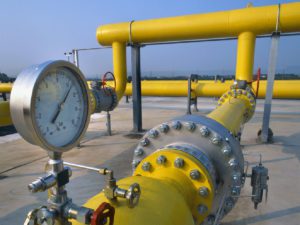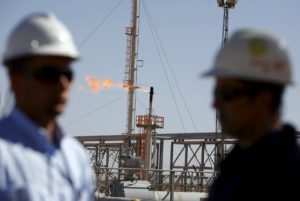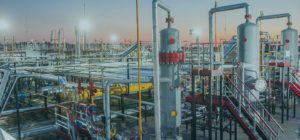
The Smart Energy Group is mulling a possibility of participating in the first electronic oil and gas auction scheduled for March 6, 2019, Smart Energy CEO Sergei Glazunov said at a press conference in Kyiv. “We looked at 10 licenses that are exhibited on March 6. There are several interesting facilities there, and we are now deciding whether to participate in them. We hope that the auctions will be held as expected – transparently and in an understandable way,” Glazunov said.
As reported, on October 24, 2018, a temporary procedure for implementing a pilot project for the introduction of electronic trading in the sale of licenses for the use of subsoil came into force. In accordance with it, the licenses are sold exclusively through electronic bidding.
On December 6, 2018 the State Service for Geology and Mineral Resources put up the first 10 sites for electronic oil and gas auctions. At the second round at the end of January seven more sites were exposed.
The first auction will take place on March 6, 2019.

Natural gas production in Ukraine in 2018 increased by 0.5% (by 106.3 million cubic meters) compared to 2017, to 20.898 billion cubic meters, the Ministry of Energy and Coal Industry has told Interfax-Ukraine. According to the ministry, the enterprises of Naftogaz Ukrainy increased gas production by 0.9% (by 152.9 million cubic meters), to 16.506 billion cubic meters during this period. In particular Ukrgazvydobuvannia increased gas production by 1.2% (by 176.2 million cubic meters), to 15.420 billion cubic meters, while Ukrnafta reduced it by 2.1% (by 23.3 million cubic meters), to 1.078 billion cubic meters. Chornomornaftogaz retained production at the level of the previous year at 8.7 million cubic meters.
Other oil and gas producing companies operating in the country in 2018 reduced gas production by 1% (by 46.5 million cubic meters) compared to 2017, to 4.391 billion cubic meters.

JKX Oil & Gas with assets in Ukraine and Russia in early 2019 reached the average daily production of 5,129 barrels (boepd), which is 27.8% more than the average figure for the fourth quarter of 2018, the company reported on the London Stock Exchange. According to the report, this result was achieved thanks to the successful testing of the IG103 wellbore, as a result of which the productivity of this well continues to exceed expectations and recently amounted to about 1,600 boepd, while the estimated production from it exceeds 30 million cubic meters.
In accordance with the presentation of JKX, last year it increased natural gas production by 4.6%, to 181 million cubic meters, oil extraction by 6.3%, to 34,000 tonnes.
The company said that in 2019 it intends to increase production in Ukraine thanks to new drilling and other measures, including research and 3D seismic exploration.
GAS, JKX, OIL, PRODUCTION

Ukraine in January-November 2018 imported 10.014 billion cubic meters of natural gas for a total of $3.015 billion, in particular in November some 1.012 billion cubic meters for $341.604 million, according to the State Statistics Service.
Thus, the average price of gas imported by the country in November 2018 was $337.5 per 1,000 cubic meters against $347.3 in October, $320 in September, $293.9 in August, $309.1 in July, $267.4 in June, $263.5 in May, $310.8 in April, $278.7 in March, $261.1 in February, and $279.4 in January.
In the 11 months of the last year, the main counterparties were companies from Switzerland with 3.679 billion cubic meters of gas worth $1.102 billion, Germany with 3.146 billion cubic meters for $929.324 million, Poland with 714.061 million cubic meters for $213.391 million, the UK with 629.451 million cubic meters for $186.219 million, and Hungary with 532.563 million cubic meters for $169.845 million.
There were no gas imports from the Russia for the specified period.

Britain’s oil and gas company Regal Petroleum Plc with assets in Ukraine boosted average daily production in 2018 at the MekhediviskaGolotvshinska (MEX-GOL) and Svyrydivske (SV) gas and condensate fields (both are located in Poltava region) by 67% or 1,088 barrels of oil equivalent per day (boepd) compared with 2017, to 2,717 boepd.
According to a company press release, totally gas production at the two fields last year came to 341,216 cubic meters (a rise of 72.3% on 2017), and condensate production – 70 cubic meters (a rise of 48.9%) and LPG output – 36 cubic meters (a rise of 50%).
Average daily production at the Vasyschevskoye (VAS) gas and condensate field in Kharkiv region in 2018 grew by 11.2%, to 674 boepd. Average daily gas production rose by 10.1%, to 94,752 cubic meters and condensate – by 26.1%, to 8.2 cubic meters.
In Q4 2018, average daily production at the three fields totaled 4,139 boepd, which is 48% more than a year ago (2,803 boepd).
The company said that At the MEX-GOL field, preparations are continuing for the drilling of the MEX-119 well. At the VAS field, acquisition of additional 3D seismic is underway, to complete the acquisition of a field-wide 3D seismic data set.
Energees Management, part of Smart-Holding of Vadim Novinsky, holds 54% in Regal.

The operating company responsible for the oil and gas sectors in the structure of the DTEK energy holding – DTEK Oil & Gas – has become the holder of 24.99% shares in private joint-stock company Kyivoblenergo earlier belonged to VS Energy International Ukraine LLC.
According to a report of Kyivoblenergo posted in the information disclosure system of the National Commission for Securities and the Stock Market, VS Energy now holds 33.60788% shares in the company.
As reported, early January 2019, DTEK announced its intention to build up 68.2949% of shares in JSC Odesaoblenergo and 93.9978% in JSC Kyivoblenergo owned by VS Energy Group.
DTEK was established in 2005 to manage the energy assets of Rinat Akhmetov’s System Capital Management Group (SCM, Donetsk). The corporation performs functions of strategic management of the group’s enterprises, which constitute a vertically integrated chain of coal production and washing, production and sale of electricity.
VS Energy International Ukrainе owns shares in the following companies: Kyivoblenergo, Rivneoblenergo, Khersonoblenergo, Kirovohradoblenergo, Zhytomyroblenergo, Odesaoblenergo, Chernivtsioblenergo, Sevastopolenergo. Also, the company owns large stakes in Mykolaivoblenergo and Khmelnytskoblenergo.
According to the unified public register of companies, the ultimate beneficiaries of VS Energy International Ukraine are citizen of Germany Marina Yaroslavskaya, as well as citizens of Latvia Vilis Dambins, Arturs Altbergs and Valts Vigants. Ukrainian media and politicians also named several Russian businessmen as beneficiaries of the company.